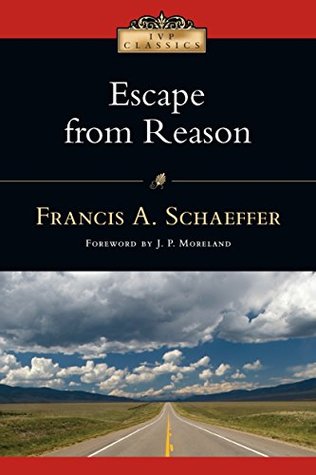More on this book
Community
Kindle Notes & Highlights
Read between
July 13 - August 10, 2021
In Aquinas’s view the will of man was fallen, but the intellect was not. From this incomplete view of the biblical Fall flowed all the subsequent difficulties. Man’s intellect became autonomous. In one realm man was now independent, autonomous.
The point to be stressed is that, when nature is made autonomous, it is destructive. As soon as one allows an autonomous realm one finds that the lower element begins to eat up the higher. In what follows I shall be speaking of these two elements as the “lower story” and the “upper story.” LEONARDO DA VINCI AND RAPHAEL The next man to examine is Leonardo da Vinci.
One of the reasons he never painted very much was simply that he tried to draw and draw in order to be able to paint the universal. Needless to say, he never succeeded.
What was the Reformation answer? It said that the root of the trouble sprang from the old and growing Humanism in the Roman Catholic Church, and the incomplete Fall in Aquinas’s theology which set loose an autonomous man. The Reformation accepted the biblical picture of a total Fall. The whole man had been made by God, but now the whole man is fallen, including his intellect and will.
This was true in two areas. First of all there was nothing autonomous in the area of final authority. For the Reformation, final and sufficient knowledge rested in the Bible—that is, Scripture Alone, in contrast to Scripture plus anything else parallel to the Scriptures, whether it be the church or a natural theology. Second, there was no idea of man being autonomous in the area of salvation. In the Roman Catholic position there was a divided work of salvation—Christ died for our salvation, but man had to merit the merit of Christ. Thus there was a humanistic element involved. The Reformers
...more
Evangelical Christians need to notice, at this point, that the Reformation said “Scripture alone” and not “the Revelation of God in Christ alone.” If you do not have the view of the Scriptures that the Reformers had, you really have no content in the word Christ, and this is the modern drift in theology. Modern theology uses the word without content because Christ is cut away from the Scriptures. The Reformation followed the teaching of Christ himself in linking the revelation Christ gave of God to the revelation of the written Scriptures.
It is an important principle to remember, in the contemporary interest in communication and in language study, that the biblical presentation is that, though we do not have exhaustive truth, we have from the Bible what I term “true truth.” In this way we know true truth about God, true truth about man and something truly about nature. Thus on the basis of the Scriptures, while we do not have exhaustive knowledge, we have true and unified knowledge.
The doctrine of the bodily resurrection of the dead is not an old-fashioned thing. It tells us that God loves the whole man and the whole man is important. The biblical teaching, therefore, opposes the Platonic, which makes the soul (the “upper”) very important and leaves the body (the “lower”) with little importance at all. The biblical view also opposes the humanist position where the body and autonomous mind of man become important and grace becomes very unimportant.
And Paul says in Romans 6 that even in the present life we are to have a substantial reality of the redemption of the whole man.
Nature had to be freed from the Byzantine mentality and returned to a proper biblical emphasis; and it was the biblical mentality which gave birth to modern science.
There is no historic basis for the later Heidegger’s position that the pre-Socratic Greeks, prior to Aristotle, thought differently. As a matter of fact it is the only way man can think. The sobering fact is that the only way one can reject thinking in terms of an antithesis and the rational is on the basis of the rational and the antithesis.
rather that the uniformity of natural causes in a closed system has become the dominant philosophy among scientists.
if man is determined, then what is, is right.
Christianity’s answer rests in the historic, space-time, real and complete Fall. Aquinas’s error was an incomplete Fall.
Often people say to me, “How is it that you seem to be able to communicate with these far-out people? You seem to be able to talk in such a way that they understand what you’re saying, even if they do not accept it.” There may be a number of reasons why this is so, but one is that I try to get them to consider the biblical system and its truth without an appeal to blind authority—that is, as though believing meant believing just because one’s family did or as though the intellect had no part in the matter. This is the way I became a Christian. I had gone to a “liberal” church for many years. I
...more


